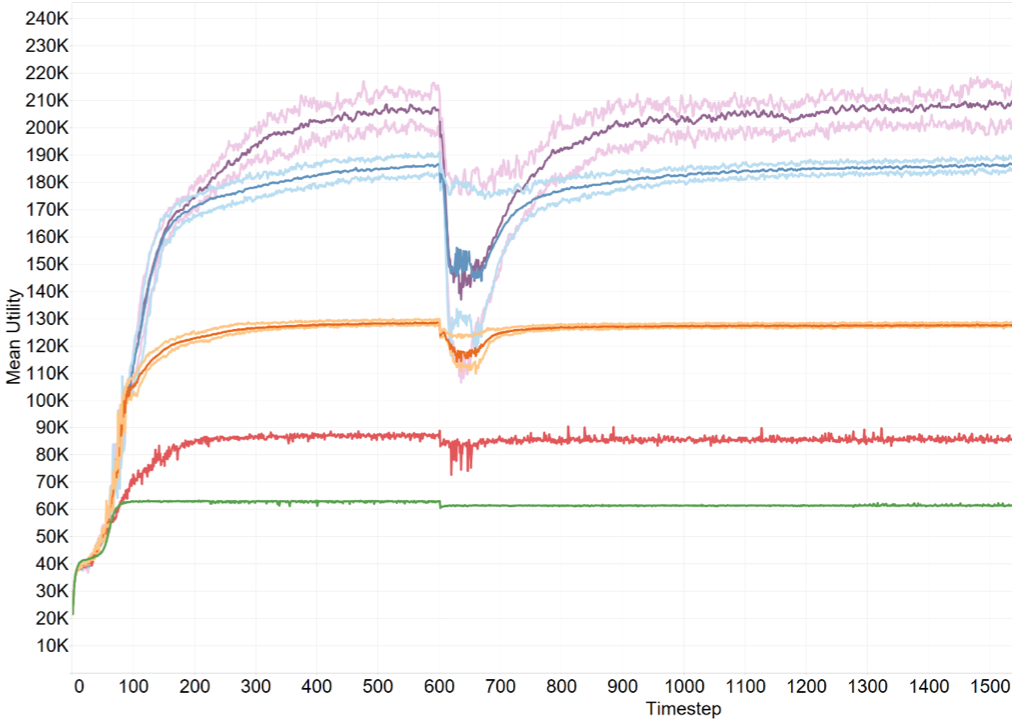BaSKET: Building a Strategy for Key Energy Transitions (BaSKET)
 The objective of this project is to develop a model to test the hypothesis that, “interacting agents are able to collectively manage a resource transition from non-renewable energy resources (e.g. fossil fuels) to renewable energy systems”. Many current energy-economy models do not fully assess resource scarcity because they fail to account for resource requirements in physical units. The only marker of scarcity is an increasing financial cost, but this cost is a function of multiple parameters (including physical scarcity) that are underdeveloped in the models. The models also do not adequately represent interdependent decisions by autonomous firms and individuals, or the interdependencies between the biosphere and economy. The first weakness implies that significant feedback loops are left unaccounted– a single “representative” firm will, by definition, underrepresent significant outliers that affect the system. The second weakness has two issues: the energy-economy link and the environment-economy link. Within most models, economic growth is not a function of energy supply or cost despite energy availability being a key driver of economic growth. Similarly, economic growth is often independent of environmental withdrawals (resource extraction), which ignores potential feedback of resource shortages.
The objective of this project is to develop a model to test the hypothesis that, “interacting agents are able to collectively manage a resource transition from non-renewable energy resources (e.g. fossil fuels) to renewable energy systems”. Many current energy-economy models do not fully assess resource scarcity because they fail to account for resource requirements in physical units. The only marker of scarcity is an increasing financial cost, but this cost is a function of multiple parameters (including physical scarcity) that are underdeveloped in the models. The models also do not adequately represent interdependent decisions by autonomous firms and individuals, or the interdependencies between the biosphere and economy. The first weakness implies that significant feedback loops are left unaccounted– a single “representative” firm will, by definition, underrepresent significant outliers that affect the system. The second weakness has two issues: the energy-economy link and the environment-economy link. Within most models, economic growth is not a function of energy supply or cost despite energy availability being a key driver of economic growth. Similarly, economic growth is often independent of environmental withdrawals (resource extraction), which ignores potential feedback of resource shortages.
 Therefore, these models provide ‘best-case’ scenarios due to their assumed central decision making and underrepresentation of the economy’s physical dependence. Developing an agent-based approach to energy resource development would simultaneously address both of these issues. An agent-based approach can account for physical resource scarcity by explicitly specifying physical reserves to be used throughout the economy. The Agent-based approach also models complex adaptive behavior of firms by generating multiple competing firms. This research would enable better insights to the physical basis of today’s complex economy for policy planning and improve an understanding of emergent system phenomena, such as technological lock-in. Hopefully, the BaSKET model will show pathways to navigate the intricacies of enegry resource deplection.
Therefore, these models provide ‘best-case’ scenarios due to their assumed central decision making and underrepresentation of the economy’s physical dependence. Developing an agent-based approach to energy resource development would simultaneously address both of these issues. An agent-based approach can account for physical resource scarcity by explicitly specifying physical reserves to be used throughout the economy. The Agent-based approach also models complex adaptive behavior of firms by generating multiple competing firms. This research would enable better insights to the physical basis of today’s complex economy for policy planning and improve an understanding of emergent system phenomena, such as technological lock-in. Hopefully, the BaSKET model will show pathways to navigate the intricacies of enegry resource deplection.
Funded by National Science Foundation Graduate Research Fellowship Program: $138,000

 Therefore, these models provide ‘best-case’ scenarios due to their assumed central decision making and underrepresentation of the economy’s physical dependence. Developing an agent-based approach to energy resource development would simultaneously address both of these issues. An agent-based approach can account for physical resource scarcity by explicitly specifying physical reserves to be used throughout the economy. The Agent-based approach also models complex adaptive behavior of firms by generating multiple competing firms. This research would enable better insights to the physical basis of today’s complex economy for policy planning and improve an understanding of emergent system phenomena, such as technological lock-in. Hopefully, the BaSKET model will show pathways to navigate the intricacies of enegry resource deplection.
Therefore, these models provide ‘best-case’ scenarios due to their assumed central decision making and underrepresentation of the economy’s physical dependence. Developing an agent-based approach to energy resource development would simultaneously address both of these issues. An agent-based approach can account for physical resource scarcity by explicitly specifying physical reserves to be used throughout the economy. The Agent-based approach also models complex adaptive behavior of firms by generating multiple competing firms. This research would enable better insights to the physical basis of today’s complex economy for policy planning and improve an understanding of emergent system phenomena, such as technological lock-in. Hopefully, the BaSKET model will show pathways to navigate the intricacies of enegry resource deplection.